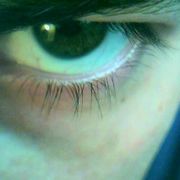
Eye contact is the event when two people look at each other's eyes at the same time[1]. It is a form of nonverbal communication, and can be an intense or emotional occurrence or a soon-forgotten event. Eye contact is a large influence on social behaviour, but it means dramatically different things at different times and in different situations. Eye contact is interpreted differently and occurs at greatly different frequencies across cultures and animal species. Eye aversion is the avoidance of eye contact.
Social meanings of eye contact
Eye contact and facial expressions provide important social and emotional information; people, perhaps without consciously doing so, probe each other's eyes and faces for positive or negative mood signs. In some contexts, the meeting of eyes arouses strong emotions. These include:
Romantic attraction
Lovers often gaze into each other's eyes for extended periods of time, using nonverbal communication to express their love or desire for one another. The eyes have often been described as the "windows of the soul".
Intimidation and status
In primate behavior, the unwavering gaze is used as a sign of dominance and threat, while gaze avoidance originated as a submissive cue. Looking directly into the others' eyes for a prolonged time may be an effective way of intimidating somebody or of initiating combat.
Most common with stutterers is the inability to maintain eye contact with the listener, which may in turn hamper the growth of personal or professional relationships.
Actors in theatre are trained to avoid specific eye contact with any members of the audience, and in film are generally instructed to avoid looking directly into the camera. This is to keep the audience from feeling self-conscious or uncomfortable.
After interviewing Saddam Hussein, Dan Rather described him as a "strong eye-contact person". Later, after being captured, Hussein avoided eye contact with his visitors.
The effectiveness of eye contact
[edit]
Physiological explanation
The size of the pupils may reveal a great deal about a person's current state. Strong emotions, convictions, and moods often stimulate the sympathetic nervous system and cause dilation of the pupils. In response to a threat or fear, this is often called the fight or flight response, and has an effect on the appearance of the eye.
The pupil may dilate if a person sees something (or someone) of interest or is aroused, thus making eye contact much more intense than it already is. Studies have shown that humans (especially females) are judged as more attractive if their pupils are wide open and more dilated than is normal.
Mother/child eye contact
Although some assert that children often respond to their mother's eyes from the moment of birth and that babies instinctively smile at black geometric spots -- perceiving them as "eyes" by six weeks of age, a 1985 study published in the Journal of Experimental Child Psychology suggested that "3-month-old infants are comparatively insensitive to being the object of another's visual regard" [4]. A 1996 Canadian study with 3 to 6 month old infants found that smiling in the infants decreased when adult eye contact was removed [5]. A recent British study in the Journal of Cognitive Neuroscience found that face recognition by infants was facilited by direct gaze [6]. Other recent research has confirmed the belief that the direct of gaze of adults influences the direct of gaze of infants.
Other explanations
Communicating attention A person's direction of gaze may indicate to others where his or her attention lies.
Facilitating learning Recent studies suggests that eye contact has a positive impact on the retention and recall of information and may promote more efficient learning.
Eye contact
 White Russian
White Russian 





